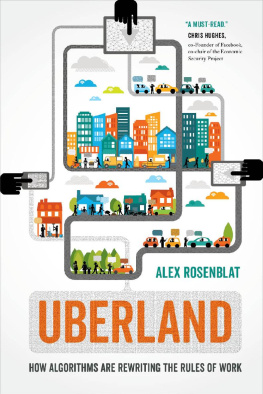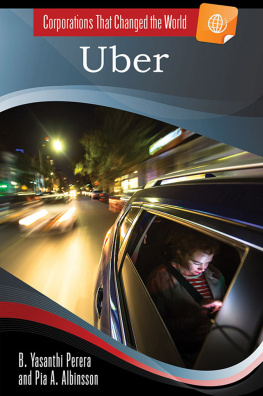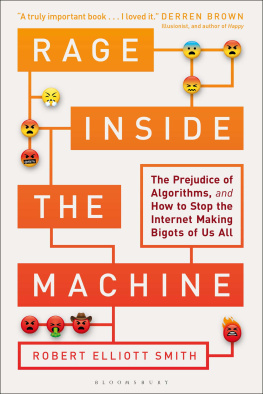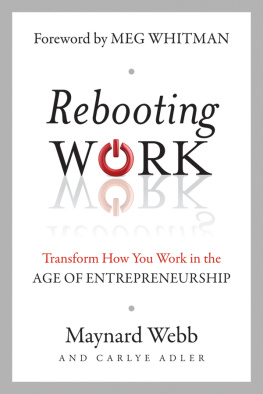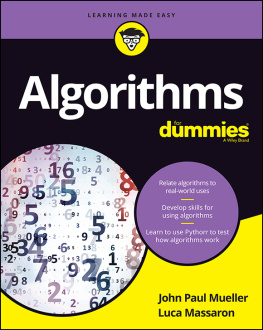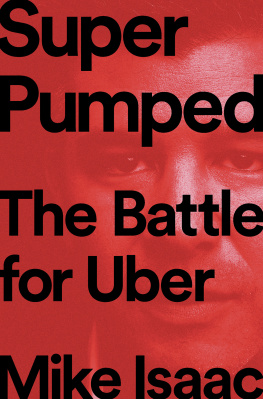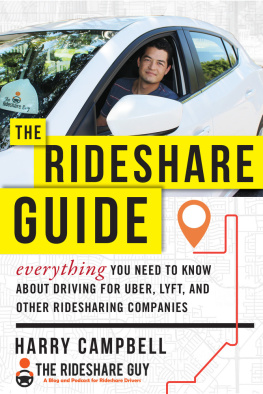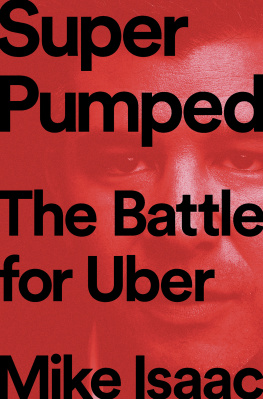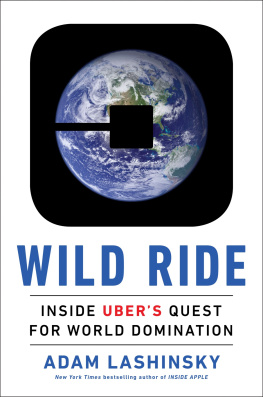ACKNOWLEDGMENTS
Shes great at making humongous Uber stories, but what does that have to do with making breakfast?
Raphael, age eight, at seven oclock in the morning
Thats just the outcome. Whats the reason?
Aron, age five, past bedtime (He asked why he had to go to bed and was warned he would get into trouble if he didnt.)
I owe special thanks to my family, my mentors, colleagues, and friends. This book also takes special inspiration from my grandfather, Ernie Rosenblat, a trucker who was always on the road, and my grandmother, Molly Rosenblat, who was very glad to see him at the end of each week.
No one has engaged more with my day-to-day discoveries in Uberland than Adam. His excitement and curiosity buoyed my own, and he gave vision and moral fortitude to a project of critical inquiry. He is also a devoted parent and husband, a doctor, and a health technology entrepreneur, and he cooks almost all of our family meals.
danah boyd is infinite in her friendship and brilliant in her mentorship. She instantly understands and appreciates the observations I can make in the world. With her unique ability to identify what people are capable of becoming, she created opportunities for me that I couldnt see myself. I am grateful to her beyond measure.
To Yossi Farren, whos been reading and supporting my work since before I knew I was doing it.
I am always grateful to Beverly and Ed, from whom I got my adventurous spirit and my educational opportunities. To Randy, who discouraged me from overworking. And to Carly, who read and shared everything I worked on.
I owe special thanks to Patrick Davison and Jeremy Durant for their editorial contributions. Patrick was invaluable to this book and all the research publications that inform it. Hes a clean and insightful academic thinker, a compassionate human, and a brilliant editor whose structural mind helped scaffold the details and analyses of driver stories. I set two goals for the writing process when I started this book: to write it quickly and to make it accessible. Jeremy Durant was indispensable to both. He helped me sharpen and organize my ideas. His keen attention to wordiness saved me from academic tangents, except where I overruled his advice. True to his word, he made my book a priority at all hours of the day and night as deadlines neared. He is more than a talented editorhe is a great friend.
Im also grateful to David Lyon, Annette Burfoot, and David Murakami Wood, who first gave me confidence to pursue sociological work. And to Ruth Donsky, my first teacher.
To Natasha Singer, Anne L. Washington, Tom Igoe, and Jessica Bruder, whose brilliance and kindness were deeply encouraging to me as I wrote this book.
To Labor Tech, a group of scholars organized by Winifred Poster, who, along with Michael Palm, offered generous feedback on my manuscript. To Frank Pasquale, who has a rare ability to detect and draw intellectual connections across different fields of research and to connect scholars accordingly.
To Stacy Abder, who patiently explained to me how things work while she was busily taking care of business. To Janet Haven, who demonstrates leadership through stewardship. To Sam Hinds Garcia, who commands respect for everyone she works with. And to Irene Chung, whose quiet competence, visible empathy, and talent for making everything both more functional and more beautiful brightened the Data & Society office for everyone who passed through it.
To Daniel Grushkin, for giving me his time and attention to help me see the bigger picture when I reached stumbling blocks. And to the Digital Cultures Research Lab at the University of Lneburg, which offered me a fellowship and provided an ideal writers retreat with wonderful colleagues at a pivotal time.
I owe thanks to so many people who helped me as I pursued the research and asked a lot of questions about technology, security, labor, media, and computer science, and these include Michelle Miller, Surya Mattu, Tamara Kneese, Finn Brunton, Christo Wilson, Caroline Jack, and Martin Shelton. And to my brilliant coworkers and colleagues whom I worked with at different stages of my interdisciplinary scholarship, including Luke Stark, Alexandra Mateescu, Julia Ticona, Ryan Calo, Tim Hwang, and many more.
And of course, I owe special thanks to the publishing team that made this book happen, including Lisa Adams and Naomi Schneider. Microsoft Research, the Open Society Foundations, the John D. and Catherine T. MacArthur Foundation, and the Robert Wood Johnson Foundation have my deepest thanks for their generosity as funders for this research and for their interest in the social impact of technology on work.
INTRODUCTION
Using an App to Go to WorkUber as a Symbol of the New Economy
Freddy, a driver with both Uber and Lyft, pulls into the parking lot when he comes to pick me up, giving me a moment to search out his large sedan on a bright day in Atlanta, Georgia. With more than three years of vagrant sociology research under my belt, Ive learned to hop into cars on busy streets as soon as I recognize the vehicles license plate from my smartphone screen. His Chevrolet Impala is spacious, and Im struck by the instrumental jazz on the car radio, which reassures me like a lightweight fleece on a foggy day. Most drivers stick to pop music when Im in the car, perhaps because of the color of my skin. And Ive heard some drivers suggest they get higher ratings from black passengers if they play Cardi B. or other rap music. I guess Freddy just enjoys jazz.
Freddy tells me hes a twelve-year veteran of the army, having left around 1989, just before the Gulf War. I explain to him that Im not just another passenger; Im a researcher studying how Uber and technology affect work. As I ask him basic questions, he tells me that he also works full time as the manager of a fast-food restaurant in a nearby city. When he has time off from his primary job, he commutes three hours into Atlanta to take ridehail jobs. During his vacation period, he spends about four days working ridehail jobs, heads home for a day or two and then returns to the lineup of drivers waiting for ride requests in the airport parking lot. We have a quale [queue], a place where all the Uber and Lyft drivers park, and I stay there. His sister lives not too far away, and thats where he showers.

